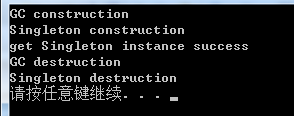c++设计模式之单例模式下的实例自动销毁(垃圾自动回收器)
关于C++单例模式下m_pinstance指向空间销毁问题,m_pInstance的手动销毁经常是一个头痛的问题,内存和资源泄露也是屡见不鲜,能否有一个方法,让实例自动释放。
解决方法就是定义一个内部垃圾回收类,并且在Singleton中定义一个此类的静态成员。程序结束时,系统会自动析构此静态成员,此时,在此类的析构函数中析构Singleton实例,就可以实现m_pInstance的自动释放。
附上测试代码
1 #include <iostream> 2 using namespace std; 3 4 class Singleton 5 { 6 public: 7 static Singleton *GetInstance() 8 { 9 if (m_Instance == NULL) 10 { 11 m_Instance = new Singleton(); 12 cout<<"get Singleton instance success"<<endl; 13 } 14 return m_Instance; 15 } 16 17 private: 18 Singleton(){cout<<"Singleton construction"<<endl;} 19 static Singleton *m_Instance; 20 21 // This is important 22 class GC // 垃圾回收类 23 { 24 public: 25 GC() 26 { 27 cout<<"GC construction"<<endl; 28 } 29 ~GC() 30 { 31 cout<<"GC destruction"<<endl; 32 // We can destory all the resouce here, eg:db connector, file handle and so on 33 if (m_Instance != NULL) 34 { 35 delete m_Instance; 36 m_Instance = NULL; 37 cout<<"Singleton destruction"<<endl; 38 system("pause");//不暂停程序会自动退出,看不清输出信息 39 } 40 } 41 }; 42 static GC gc; //垃圾回收类的静态成员 43 44 }; 45 46 Singleton *Singleton::m_Instance = NULL; 47 Singleton::GC Singleton::gc; //类的静态成员需要类外部初始化,这一点很重要,否则程序运行连GC的构造都不会进入,何谈自动析构 48 int main(int argc, char *argv[]) 49 { 50 Singleton *singletonObj = Singleton::GetInstance(); 51 return 0; 52 }
运行结果:




